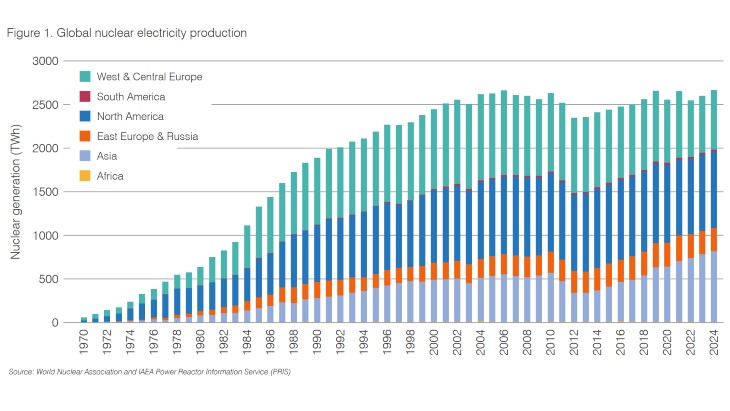Companies involved in thepush for new nuclear power in the UK reacted favourably to thegovernment invitation of 10 January to submit their plans for new build.
France's Areva led the pack with a release which said "the UK is a longstanding priority for Areva." Luc Oursel, President of Areva NP, the group's reactor building division, said: "Our ambition is to build between four and six reactors in the UK." He was referring to the EPR pressurized water reactor, which outputs 1650 MWe, under construciton in Finland and France and planned for China.
Three other reactor manufacturers are in the frame for new build contracts - AECL, GE-Hitachi and Westinghouse - although only three of the four can graduate to the last stage of Generic Design Assessment required for licensing of new plants to operate.
British Energy (BE) reminded editors that it controls the most likely sites for new nuclear, and that it has been in talks with a range of companies since February 2007. "We are ready for new build and have the sites, the people, skills and experience essential for its success," said CEO Bill Coley.
BE has already made agreements for grid connections at its existing Sizewell, Hinkley Point, Dungeness, and Bradwell nuclear power sites.
At the centre of discussions, BE has long remained silent on identities of preferred partners. In coming weeks it is thought that a small number of powerful consortia will emerge to finance and build new nuclear plants, almost certainly at existing nuclear sites.
A report in the Daily Telegraph linked a number of firms to possible new build projects including Centrica, the owner of British Gas.
EDF Energy, owned by Electricité de France, would be a natural partner for Areva, and it would be hard to imagine any consortium that not including British Energy. Generator, EOn, is keen to build while construction and engineering groups Amec, Costain, and Halcrow have all also been mentioned in connection with nuclear plans.
Political stablility
Crucially for upcoming investment decisions, the Labour government's even-handed approach to nuclear power was matched by its Conservative opposition.
Shadow business and enterprise minister Alan Duncan welcomed his opposite number's announcement and explained his party's view on nuclear power: that the planning system must be refined; a price for carbon is required for long-term investment; clarity is required on waste and decommissioning; and there should be no subsidy for nuclear power.
Duncan assured business that the investment climate would remain stable under a possible future Conservative government.
This marks a major change over several months, since Conservative leader David Cameron enlisted Ecologist editor Zac Goldsmith as an advisor, resulting in a rash of anti-nuclear sentiment. Goldsmith is now expected to part company with the Conservatives.
Firms get set for new build
Companies involved in thepush for new nuclear power in the UK reacted favourably to thegovernment invitation to submit their plans for new build. Areva has announced that it wants to build four to six large reactors in the country.




_77790.png)
_59102.jpg)
_49833.jpg)
_22592.jpg)




